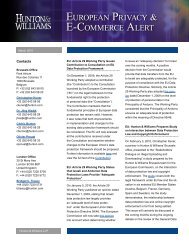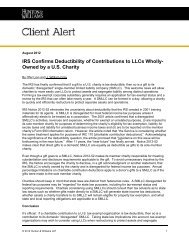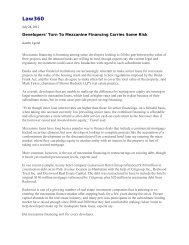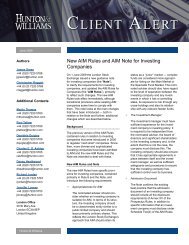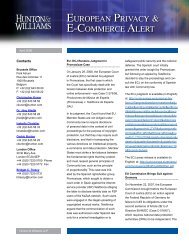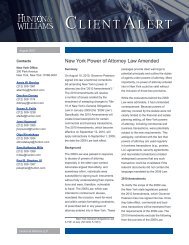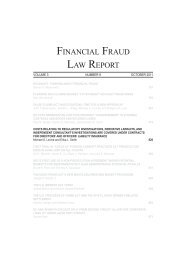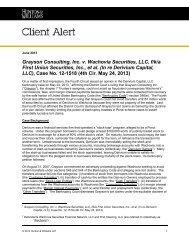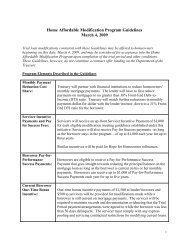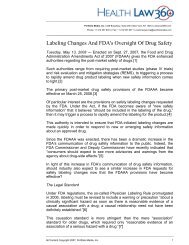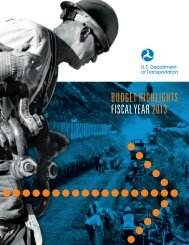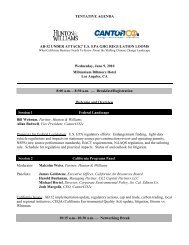Hunton & Williams Renewable Energy Quarterly, September 2009
Hunton & Williams Renewable Energy Quarterly, September 2009
Hunton & Williams Renewable Energy Quarterly, September 2009
You also want an ePaper? Increase the reach of your titles
YUMPU automatically turns print PDFs into web optimized ePapers that Google loves.
<strong>Renewable</strong> <strong>Energy</strong> <strong>Quarterly</strong><br />
the owner or the partnership that is a direct or indirect<br />
owner to a disqualified person; (2) the property ceasing to<br />
qualify as specified energy property; and (3) other specified<br />
events applicable to particular types of renewable energy.<br />
A property may be sold to an entity other than a disqualified<br />
person without triggering recapture, so long as the<br />
property continues to be specified energy property, and the<br />
purchaser of the property agrees to be jointly liable for any<br />
recapture. Private investment fund sponsors should consider<br />
addressing potential recapture issues in fund partnership<br />
agreement provisions prohibiting transfers and assignments<br />
of fund interests to disqualified persons, investment<br />
guidelines prohibiting dispositions of projects to disqualified<br />
persons, distribution clawbacks requiring partners to return<br />
distributions associated with the recaptured amounts, and<br />
provisions establishing specific reserves.<br />
Because of these difficulties in providing maximum benefits<br />
(and therefore returns) to some of the traditional sources of<br />
private equity capital — tax exempts, high-net-worth individuals<br />
and offshore investors — sponsors of a new Project<br />
Fund should carefully consider its target investor base<br />
before launching the fund. Before embarking on a renewable<br />
energy project investment or strategy, an existing fund<br />
should consider its investors and any provisions in its partnership<br />
agreement or other fund documents that allow it to<br />
consummate investments while excluding certain investors.<br />
Timing<br />
The Treasury began accepting applications for the grant<br />
program on July 31, <strong>2009</strong>, and awarded approximately<br />
$500 million of grants in the first round of awards in early<br />
<strong>September</strong> <strong>2009</strong>. For property placed in service in <strong>2009</strong> or<br />
2010, an application cannot be submitted for a project until<br />
after the project is placed in service, and must be submitted<br />
before October 1, 2011. For projects that are under<br />
construction in <strong>2009</strong> or 2010, but not placed in service until<br />
after 2010, applications must be submitted after construction<br />
has begun, and before October 1, 2011. As a result of these<br />
timing issues, fund managers may have a limited window in<br />
which to deploy capital under these beneficial programs, so<br />
will need a plan to raise and invest this capital on a diligent<br />
basis.<br />
Conclusion<br />
Existing and new private investment fund sponsors confront<br />
several threshold considerations in determining whether<br />
renewable energy investing is right for them. Fund managers<br />
generally are likely to come under increasing regulation<br />
and scrutiny, and it is likely that taxes on traditional forms of<br />
private equity compensation will increase. Federal and state<br />
governments have traditionally provided incentives to investors<br />
in renewable energy projects, and those incentives have<br />
recently been expanded. However, fund sponsors should<br />
consider whether these benefits can be adequately transferred<br />
to their anticipated investor base, as several traditional<br />
sources of private equity capital may have problems realizing<br />
these benefits or require special structuring in order to do so.<br />
There are strategies to deal with many of these issues, but<br />
they should all be confronted early in the planning process<br />
so all parties have realistic and achievable expectations.<br />
29 <strong>Renewable</strong> <strong>Energy</strong> <strong>Quarterly</strong> www.hunton.com



